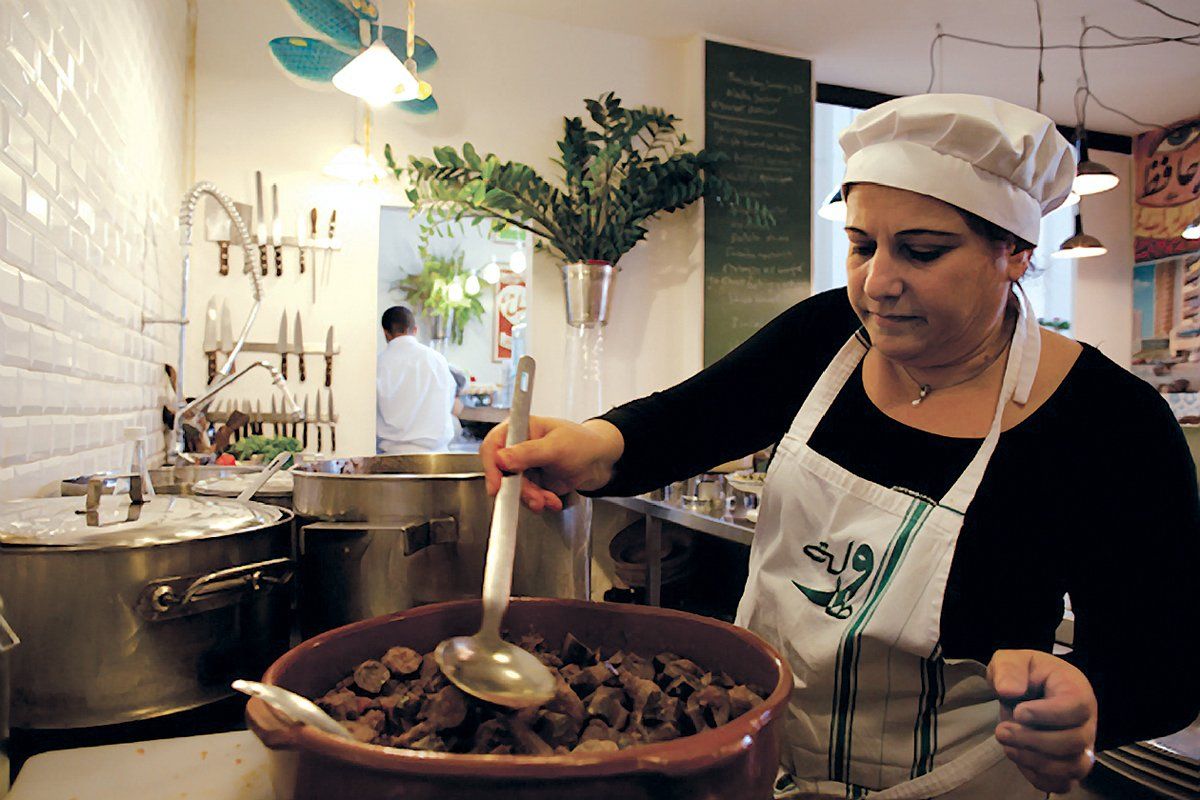
For decades, dinner at Arabic restaurants the world over has had a certain predictability: There will be hummus. There will be tabbouleh and other small plates, followed by grilled meat of some kind. Even in Beirut, often acknowledged as the region's culinary capital, the routine rarely varied—until now.
When foreigners think of Middle Eastern food, they usually picture meze, the constellation of tiny, exquisite appetizers that Mediterranean social life revolves around: hummus, tabbouleh, baba ghanouj, and grape leaves stuffed with rice. But the Middle East has another universe of food, one that few outsiders get to taste. In Syria and Lebanon, its apotheosis is tabeekh: home cooking, traditionally made in a tabkha, the humble vessel where most of these one-pot meals come to life.
If meze is the urban social food of the Mediterranean, tabeekh is Levantine comfort food. It's part of a cuisine of rural peasants, people who use what's in season and extend the little meat they can afford with vegetables and grains. It abounds with cheaper, humbler ingredients than meze: wheat, semolina, legumes, and foraged wild greens. It includes lentils and bulgur suffused with caramelized onions; wild gundelia root stewed with lamb; roasted cauliflower stew with garlic and cilantro; and toasted green wheat cooked with chicken and cinnamon—to name just a few of my favorites.
When I first moved to Beirut in the fall of 2003, only a handful of restaurants served this kind of food. They were comfortable, cheap, the opposite of chic. At Le Chef, Walimat, and Aunty Salwa, a cook ladled out the sahan youmi, or the plat du jour, from a cauldron of stew simmering on the stove; in the winter, the windows were fogged with steam. The daily specials were written on a chalkboard and erased by late afternoon when they ran out. Students, pensioners, and civil servants relied on these places for cheap midday meals, but Beirut's elite considered tabeekh too plebeian for eating out: why pay money for the stuff your mother could make at home?
But over the past seven years or so—a time of assassinations, car bombings, the Arab world's first nonviolent revolution, and a short but devastating war between Israel and Hizbullah—that began to change. In 2004 a man named Kamal Mouzawak started a farmer's market where farmers and small food producers could sell local foods directly to customers. Souk El Tayeb became one of the city's trendiest destinations, and a shift toward slow, fresh, and rural began breaking down the walls between humble home cooking and upscale restaurant fare. Now a new generation of chefs is transforming the restaurants of the Middle East, where change comes slowly and then all at once.

In 2009 Mouzawak opened Tawlet ("table" in Arabic), a restaurant dedicated to promoting rural, traditional home cooking. At the end of a cul-de-sac, in a neighborhood dominated by auto-body shops, diners serve themselves from a buffet inside a converted storefront. The staff retrieves napkins and other supplies from shelves made out of wooden pallets. A chalkboard lists the kinds of dishes that, until recently, were the province of Lebanese grandmothers: swiss chard stuffed with bulgur wheat, chewy whole-wheat pockets filled with wild green oregano, and okra stew. But the customers eating at the long communal table or lounging on secondhand sofas might include anyone from Beirut's swankiest artists and entrepreneurs to globe-trotting foodies like Anthony Bourdain. Mouzawak conceived of Tawlet as a partner to Beirut's farmers' market: every day, the restaurant features food from a different region of Lebanon, often prepared by artisan producers from the market who serve as guest chefs. And every week Tawlet offers cooking classes that showcase traditional fare. Last fall, I went to a class taught by Suzanne Douaihy, a ponytailed mom from Zgharta, a town in northern Lebanon famous for its food. All four of the students were Americans: two foodies from California, me, and another writer.
With Tawlet's in-house chef as her assistant, Douaihy made kibbeh basalieh, a mixture of finely ground meat and bulgur wheat blended with spices and spread in a tray over a bed of sliced onions. She soaked the dark brown bulgur wheat in water and squeezed the water out with her fists. "You have to do this by hand," she said severely in Arabic. "Otherwise it won't come out right." She massaged in the meat and spices, also by hand, and put the dish in a 260° C oven. By the end of the class, everyone had learned how to make something exquisite out of the humblest ingredients. We ate the finished dish, which was crispy on the outside and tender on the inside. The chef, who was dressed in a toque and chef's whites, hugged Douaihy, who smiled shyly. "She is my god!" he said.
Ciezadlo is the author of Day of Honey: A Memoir of Food, Love, and War.
Uncommon Knowledge
Newsweek is committed to challenging conventional wisdom and finding connections in the search for common ground.
Newsweek is committed to challenging conventional wisdom and finding connections in the search for common ground.
About the writer
To read how Newsweek uses AI as a newsroom tool, Click here.





